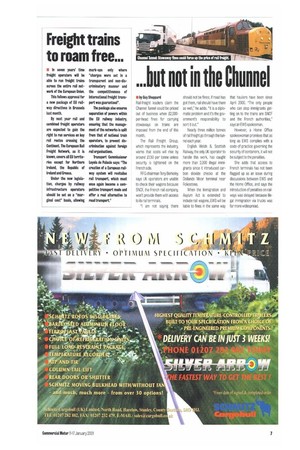...but not in the Chunnel
Page 9

If you've noticed an error in this article please click here to report it so we can fix it.
• by Guy Sheppard
Rail-freight leaders claim the Channel Tunnel could be priced out of business when £2,000per-head fres for carrying stowaways on trains are imposed from the end of this month.
The Rail Freight Group, which represents the industry, warns that costs will use by around £1.50 per tonne unless security is tightened on the French side.
REG chairman Tony Berkeley says UK operators are unable to check their wagons because SNCF, the French rail company, won't provide them with access to its rail terminals.
"I am not saying there should not be fines; if road has got them, rail should have them as well," he adds. "It is a diplomatic problem and it's the government's responsibility to sort it out."
Nearly three million tonnes of rail freight go through the tunnel each year.
English Welsh & Scottish Railway, the only UK operator to handle this work, has caught more than 2,000 illegal immigrants since it introduced carbon dioxide checks at the Dollands Moor terminal near Folkestone.
When the Immigration and Asylum Act is extended to include rail wagons, EWS will be liable to fines in the same way that hauliers have been since April 2000. "The only people who can stop immigrants getting on to the trains are SNCF and the French authorities," says an EWS spokesman.
However, a Home Office spokeswoman promises that as long as EWS complies with a code of practice governing the security of containers, it will not be subject to the penalties.
She adds that access to French terminals has not been flagged up as an issue during discussions between EWS and the Home Office, and says the introduction of penalties on railways was delayed because illegal immigration via trucks was far more widespread.
































































































